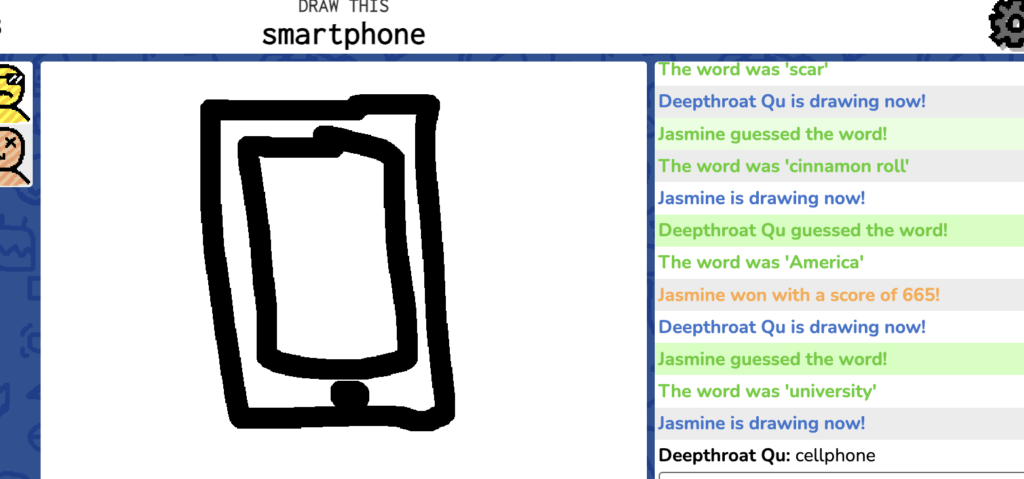This week, I chose to play Skribbl.io, a free online interactive multiplayer game that involves drawing and guessing. Developed by ticedev does not include a recommended age rating, but is definitely family friendly. Given that players still need basic drawing skills to sufficiently enjoy the game, and interpret some more complex concepts, I would say that the ideal age range for a player of this game is 10+. The game can be played among 2 to 20 players.
Initially, I was going to play the game with online players I did not know, but found the contents of the chat irrelevant to the game and offensive. Therefore, I opted to start a private room to play with another friend, and felt that this gave me a much better opportunity to get a feel for the game. I think some form of content moderation is needed for the public rooms in the game. The playing experience would be greatly enhanced by limiting the chat to only consist of word guesses, or muting players that use flagged language, as I was completely put off from wanting to know about the other players in the public room.

In this game, the judging relates to other players guessing what one player is drawing. The player selects the word to draw from three choices. The point system is a unique mechanic of the game – there are points awarded to both the players that are performing the drawing and the players doing the guessing. The points awarded to the drawers are based on how fast and how many players are able to correctly identify the drawing. The points awarded to the guessers are based on how quickly they guess. This award system encourages efficiency in both drawing and guessing. I think this form of judging generally does a strong job of building friendships, as it creates an implicit alliance between the drawer and the guesser. Players want each other to mutually do well, which is a strong way to connect throughout the gameplay. I also thought the option to do a private room lends itself to socialization quite well — as discussed in game design patterns for building friendships, this decreases virtual proximity in a way that lends itself well to relationship building. The chat in the private room also felt less hostile, which kept me comfortable throughout the game play.

I have a few critiques, however. First, my other player was automatically given the name “deepthroat queen” by the game. Something like this is funny for me as an older player, but feels inconsistent with the otherwise wholesome vibe of the game itself. If the game wants to allow more risque content with randomly generated names or public chat rooms, it needs to be more consistent with its theming. Being inconsistent with its level of edginess can alienate some players, and make the social interaction part of the game less fun and welcoming. I also think the game should implement some point system that rewards for guessing synonyms. As shown in the screenshot, the other player guessed a similar enough word that got to the essence of the drawing, but did not use a word that is more outdated. This puts the game at an awkward spot, as the guesser simply doesn’t know what’s wrong with the word they guessed, and the drawer has nothing meaningful they can add to differentiate which exact word they’ve been assigned.
Overall, I really enjoyed playing skribbl.io. The judging related to guessing a drawing was a fun way to be judged, especially because drawing a chosen word doesn’t feel too vulnerable or demanding. The fun in part relies on players being weak at drawing, which introduces a fun sense of camaraderie among drawers and guessers alike.



